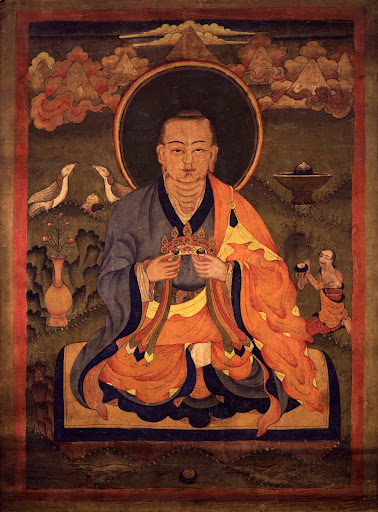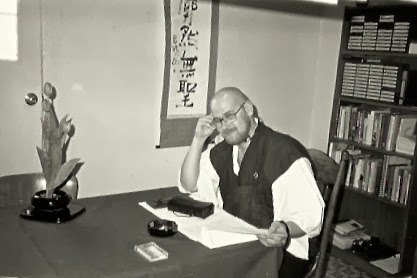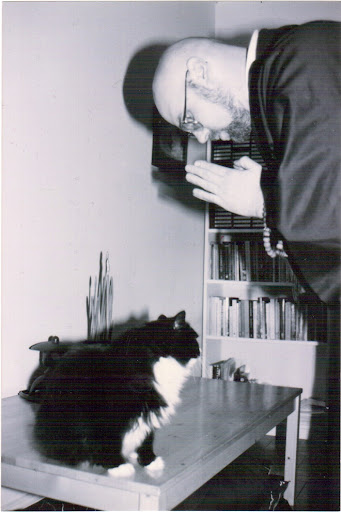
Rahula in a Tibetan thangka

Rahula in a Tibetan thangka
eMirror Vol 26, No. 48
Friday, November 25th, 2022
Edited by the Practice Council
The White Wind Zen Community:
An international community practising and teaching Dogen’s Zen since 1985.
[The Roshi continues reading his translation of “Big Advice to Rahula,” or the Maha Rahulovada Sutta from the book The Thread of Practice.]
“Practise friendliness,1 Rahula. Becoming kind, malevolence is released.
“Practise compassion,2 Rahula. Becoming compassionate, violence is released.
“Practise benevolence,3 Rahula. Becoming benevolent, aversion4 is released.
“Practise equanimity,5 Rahula. Becoming balanced, anger is released.
“Practise the contemplation of impurity,6 Rahula. Contemplating impurity, obsession is released.
“Practise the recognition of impermanence,7 Rahula. Practising the recognition of impermanence, asserting a self is released.
“Practise being mindful of the breath, Rahula. Practising continuous mindfulness of breathing in and breathing out leads to a vast harvest and great riches. And how, Rahula, is mindfulness of breath practised and how does its sincere practice lead to a great harvest of richness?
“Here, Rahula, one goes into the forest, to the roots of a tree, or to an empty room, sits down cross-legged and holds the body upright, keeping mindfulness present.
“Breathing in, one is mindful; breathing out, one is mindful. Breathing out a long breath, one understands, ‘I breathe out a long breath.’ Breathing in a long breath, one understands, ‘I breathe in a long breath.’
“Breathing out a short breath, one understands, ‘I breathe out a short breath.’ Breathing in a short breath, one understands, ‘I breathe in a short breath.’
“One practises, ‘I breathe out with full experience of the whole body.’ One practises, ‘I breathe in with full experience of the whole body.’
“One practises, ‘I breathe out, calming the tendencies of the body.’ One practises, ‘I breathe in, calming the tendencies of the body.’
“One practises, ‘I breathe in, experiencing joy.’ One practises, ‘I breathe out, experiencing joy.’
“One practises, ‘I breathe in, experiencing happiness.’ One practises, ‘I breathe out, experiencing happiness.’
“One practises, ‘I breathe in, experiencing habitual patterns of mind.’ One practises, ‘I breathe out, experiencing habitual states of mind.’
“One practises, ‘I breathe in, calming habitual patterns of mind.’ One practises, ‘I breathe out, calming habitual states of mind.’
“One practises, ‘I breathe in, experiencing mind.’ One practises, ‘I breathe out, experiencing mind.’
“One practises, ‘With contentment of mind I breathe in.’ One practises, ‘With contentment of mind I breathe out.’
“One practises, ‘With a harmonious mind, I breathe in.’ One practises, ‘With a harmonious mind I breathe out.’
“One practises, ‘With a freed mind I breathe in.’ One practises, ‘With a freed mind I breathe out.’
“One practises, ‘Realizing dispassion, I breathe in.’ One practises, ‘Realizing dispassion, I breathe out.’
“One practises, ‘Realizing cessation,8 I breathe in.’ One practises, ‘Realizing cessation, I breathe out.’
“One practises, ‘Realizing renunciation, I breathe in.’ One practises, ‘Realizing renunciation, I breathe out.’
“This is the practice of mindfulness of breath, Rahula. This is how the sincere practice of mindfulness of breath leads to a vast harvest and great richness. If mindfulness of breath is practised continuously, then your last breath will be in knowing, not in unknowing.”
Thus spoke the Generous One. His heart gladdened, the Venerable Rahula enjoyed the speech of the Generous One.9
Well. Did any flowers bloom as you listened? Oh, you missed them? Did flowers fall from the sky when you understood something? If so, did you create them? If so, of course you did. In each moment of breathing in and breathing out, what are we fabricating? What are we missing? Let’s find out.
Please, enjoy yourselves.
1 Metta.
2 Karuna.
3 Mudita.
4 Arati.
5 Upekkha.
6 Asubha. Contemplation of the whole of the body reveals much that one might feel is impure or unpleasant; thus grasping at the exaggeration of pleasant qualities is balanced.
7 Aniccasanna
8 Nirodha.
9 See The Thread of Practice: Pali Discourses of the Buddha, translated by Ven. Anzan Hoshin roshi and Tory Cox, WWZC Archives, 1995
-Ven Anzan Hoshin roshi, concluding teisho One: "Flowers Falling" in the series "Flowers and Worms", Hanamatsuri sesshin, April 11th to 14th, 1991, Zazen-ji.
Fusatsu: December 7th and 21st
Rohatsu O-sesshin
The seven-day Rohatsu O-sesshin begins at 8:00 p.m. on Thursday, December 1st and ends on December 8th, following Jodo-e (commemorating the Buddha's Awakening).
Cancelled Sittings during the Rohatsu O-sesshin - December 1st to 8th
During the Rohatsu O-sesshin, the following sittings are cancelled:
Morning formal sittings Saturday, December 1st to Thursday, December 8th
Associate sitting on Thursday, December 1st
General sitting on Monday, December 5th
Combined Associate and General Sitting - Saturday, December 3rd
Associate and general students are welcome to register to attend the combined sitting on Saturday, December 3rd. This will be the only sitting open to associate and general students during the Rohatsu O-sesshin (December 1st-8th). Seating is limited so please register early: https://www.eventbrite.ca/e/combined-associate-general-sitting-december-3rd-2022-tickets-474882003857
Rohatsu O-sesshin
The seven-day Rohatsu O-sesshin begins at 8:00 p.m. on Thursday, December 1st and ends on December 8th, following Jodo-e (commemorating the Buddha's Awakening).
A Note to Preliminary and Public Students Concerning O-sesshin
During an O-sesshin the schedule is such that there is no time to meet face to face with preliminary students or to reply to email correspondence sent by public students. Public students are asked to send their weekly practice journals, as they will be reviewed. But unless there is something that needs an immediate reply, you will not receive an email reply until the week following the O-sesshin.
Jodo-e: December 8th.
Introduction to Zen Workshop Ottawa
The next Introduction to Zen Workshop will take place on Saturday, December 10th, at 1:45 p.m. To register for the next workshop: https://IntroductionToZenWorkshop.eventbrite.ca
For more information please see:
Introduction to Zen Workshop (Ottawa)
For information concerning our Long-distance Training Program (for students living an hour or more commuting distance from the monastery in Ottawa), please visit this Web Page: Long Distance Training Program | White Wind Zen Community
Dainen-ki
December 12th is the anniversary of the day on which the Roshi’s Teacher, Ven. Yasuda Joshu Dainen roshi died.
Joya (New Year’s Celebration)
On Saturday, December 31st at 10 p.m. until Sunday, January 1st at 12:00 a.m., we will celebrate Joya or New Year with 108 recitations of the Mahaprajnaparamita Hridaya sutra mantra at midnight.
Hermitage:
The Roshi is continuing an extended period of "self-isolation" due to underlying health issues until the COVID-19 situation clarifies.
Teisho presented by Ven. Anzan Hoshin roshi at Zazen-ji, on March 21st, 1991: https://wwzc.org/dharma-text/river-memory
Rev. Chiso anagarika sat her weekly semi-retreat on Tuesday, November 22nd at her home in the Berkshires. Thach Hoang sat a one and a half day retreat from Saturday, November 12th to Sunday, November 13th at his home in Laval, Quebec. Charlane Bishop sat a half-day retreat on Monday, November 21st at her home in Newtonville, Nova Scotia. Tracey Parker sat a partial retreat on Saturday, November 20th at her home in Perth, Ontario.
If you would like to sit a retreat at Dainen-ji, please email schedule@wwzc.org to register a week in advance. For further information please visit this page: https://wwzc.org/retreats
If you would like to sit a retreat at home please follow the schedule outlined in this page:
https://wwzc.org/retreat-schedule-public-students. After your retreat, please send an email to schedule@wwzc.org to confirm that you sat a retreat and include the duration and location.
Saturday, November 26th to Saturday, December 3rd
Saturday, November 26th: "Paramita" by Ven. Anzan Hoshin roshi: "Virya: Exertion" (5 of 7, 18 minutes)
Sunday, November 27th: SAkN "The Anatomy of Awakening" by Ven. Anzan Hoshin roshi: "Feeling into Knowing: Sagara Mudra Samadhi" (teisho 9 of 9)
Monday, November 28th: “The Touchstone" by Ven. Jinmyo Renge sensei: "The Touchstone 3, Sticks and Feathers" (teisho 3 of 22, 22 minutes)
Saturday, December 3rd: "Paramita" by Ven. Anzan Hoshin roshi: "Dhyana: Zazen Makes Fools of Us All" (6 of 7, 25 minutes)
Associate and general students should continue to follow the recorded Teachings schedule for the sitting you were attending at the monastery, and listen to that during your home practice.
You can access the online Recorded Teachings Library at wwzc.org/recorded-teachings-schedule.
You can also use the streaming site at app.wwzc.org to live stream recordings from the online Library. If you have forgotten your password or need assistance with accessing the recorded Teachings, please email schedule@wwzc.org.
Please note that teisho should be listened to in the correct order and with none missed out as themes, metaphors, questions raised and answered evolve in spirals throughout the series.
While most of the online Recorded Teachings library is password-protected and only accessible to students of the Lineage of Zen Master Anzan Hoshin, a small selection of MP3 recordings of teisho are accessible to the public at wwzc.org/recorded-teachings Additional recordings will be uploaded periodically. MP3 recordings of four recorded teisho by Ven. Anzan Hoshin roshi are currently available:
Dharma Position https://wwzc.org/dharma-position
Eyes See, Ears Hear https://wwzc.org/eyes-see-ears-hear
Embarrassment https://wwzc.org/embarrassment
Ven. Anzan Hoshin roshi's reading of his translation of Eihei Dogen zenji's “Bendowa: A Talk on Exerting the Way”: https://wwzc.org/bendowa-talk-exerting-way

Photograph of Ven. Anzan Hoshin roshi at Daijozan, mid-1980s,
by Ven. Shikai Zuiko sensei
Ven. Anzan Hoshin roshi has recently completed translation work on some shorter texts by Eihei Dogen zenji from the Shobogenzo. The work on these particular texts is based upon the literal translations that he worked on with Joshu Dainen roshi at Hakukaze-ji around 1977-78 followed by many years of putting them down, picking them up, and polishing. Naturally, more essential texts such as Uji, Genjokoan, Shinjin Gakudo and some 40 others were completed first and have been given extensive commentaries by the Roshi. This batch of texts includes Baike: Plum Blossoms, Ryugin: Howling Dragon, and Udonge: The Udumbara Blossoming and many others are nearing completion. Annotation details and successfully conveying them across various document formats are the issue at this point.
Work on Bussho: Buddha Nature, a very long and nuanced text by Dogen zenji, is ongoing.
Roshi is also finishing an update to the Saijo Shingi: The Deportment of Radiance, our manual of monastic training standards which is a supplement to the ancient Eihei Shingi and Keizan Shingi.
Begun by Ven. Shikai Zuiko o-sensei
Finished by Rev. Fushin Comeau shramon following her death

Three Jewels; Triratna (S); Sambo (J): Buddha, Dharma, and Sangha; Awareness, what arises within Awareness, the seamlessness of these two.
Posted November 18th, 2022. New entries are posted every two weeks.

Dogen zenji taught in the Tenzo Kyokun: Instructions for the Tenzo (https://wwzc.org/dharma-text/tenzo-kyokun-instructions-tenzo) that the work of preparing and serving meals is "a matter for realized monks who have the mind of the Way “, or by senior disciples who have roused the Way-seeking mind." In alignment with this, part of Zen Master Anzan Hoshin's samu for the Community involves personally overseeing the activities of the ancient Office of Tenzo. Ven. Jinmyo Renge sensei serves as Tenzo and Mishin godo and Saigyo ino offer assistance as tenzo-anja. The following meals were prepared on Monday, Tuesday and Thursday evenings:
Monday Yakuseki:
Brown calrose rice cooked with sesame oil, mixed with sauteed chopped onions, scallions, sauteed diced sweet potato, shoyu, gochugaru, served with roasted peanuts; leek soup made with chopped leeks, sauteed firm tofu, minced garlic and ginger, mushroom stock, vegetable stock, chopped Napa cabbage, shoyu, shiro miso, white pepper; Asian pear with lime juice and chilli flakes.
Tuesday Yakuseki:
Mixed grain (calrose, arborio, pearled barley, white and brown Thai rice, cooked with turmeric); coleslaw made from green cabbage, carrots, daikon, thinly sliced white onion, mayonnaise, horseradish, lots of black pepper.
Vegetarian option: firm tofu cooked with Yeo’s chilli sauce.
For those who wished to supplement their diet with meat: chicken thighs seasoned with onion powder, garlic powder, Madras curry powder, garlic powder, cumin and coriander powders, sea salt, black pepper, smoked paprika, bran oil.
Thursday Yakuseki:
Legume and grain soup (red and green lentils, yellow and green split peas, basmati rice, pearled barley, diced Yukon gold potatoes, diced carrot, chopped onion, minced garlic, tomato paste, vegetable stock, thyme, cayenne, lots of black pepper and a little apple cider vinegar; Salad (romaine lettuce, radicchio, chopped cucumbers, radishes, slivered onions, chopped tomatoes); white and whole grain baguettes.

Anzan roshi and Dai-un 1992
If you would like to thank someone for a contribution they have made, please feel free to send an email to Jinmyo sensei at rengezo@gmail dot com, but be sure to type "eMirror” in the subject line.
From Jinmyo sensei:
Thank you to Mishin godo, Saigyo ino and Fushin shuso for ensuring that copies of the “eMirror” published each week are archived properly. They provide a very complete record of activities in the monastery and at Branch Centres over the past 26 years, including quotes from teisho, photographs of the monastery, events, ordinations, acceptance of students, retreats, meals served, samu projects and renovation projects, to name a few. Thank you to Mishin godo for finding distributors from whom we can purchase dry goods in bulk; to Fushin shuso for providing fresh cat grass for the monastery cats; to Senbo for maintaining our Website; to Leonardo for washing mountains of cleaning cloths and kitchen cloths; to David Gallant and Hannah Kent for their work on an attendance application; to Greg Parker for restoring very old sash windows in what will become a guest room on the first floor.
From Mishin godo:
Thank you to the Roshi for the images and extracts of teisho he has presented which appear in every issue of the eMirror and are read by students and members of the public around the world. Thank you to Jinmyo sensei for writing the Retreat Handbook with extensive instructions to guide students in the forms when sitting retreats at Dainen-ji. Thank you to Saigyo ino for weekly grocery trips to purchase the food for meals prepared by the Office of the Tenzo. Thank you to Fushin shuso for archiving issues of the eMirror and for looking after Kuro, the newest monastery cat-resident.
From Saigyo ino:
Thank you to the Roshi and Jinmyo sensei for purchasing very good gongs for use in the Practice Halls. Thank you to Mishin godo for cleaning incense bowls and to Fushin shuso for attaching doors to the cupboards in the basement hallway. To Leonardo Nobrega for cleaning the Hatto fans before putting them away for winter and to David Gallant for work on an attendance application we can use for the sittings at the monastery. To Greg Parker for samu to sand and prepare the sash windows removed from the unfinished guest room on the first floor.
From Fushin shuso:
"Thank you to Ven. Anzan Hoshin roshi for the November Sesshin. Thank you Ven. Jinmyo Renge sensei for leading the November Sesshin, for preparing all of the meals for Sesshin and for Dokusan for everyone attending Sesshin. Thank you Ven. Saigyo ino for a new Monastery weekly calendar and for new notice boards on the first floor to track daily samu tasks. Thank you to Leonardo Nobrega for fixing the archiving printer."
From David Gallant:
Thank you to Jinmyo sensei for regular dokusan, and for preparing many nourishing meals for residents each week. Thank you to Mishin godo for a link to an air purifier. Thank you to Saigyo ino for doing the grocery shopping for Dainen-ji each week.
From Ian Richard:
Thank you to the Roshi for the clarity, depth, and humour of so many teisho. Thank you to * for the words and images posted on the cloakroom bulletin board. Thank you to Mishin godo for last week's practice interview and showing me how to not fixate on words. Thank you to the monastics and residents for so much teaching wordlessly through example, as well as for all the work that goes into preparing and cleaning the practice halls before and after each sitting.
From Charlane Bishop:
Thank you to Mishin Godo and Saigyo ino, for answering questions that I don't yet know how to ask, with such skill, patience and kindness.
|